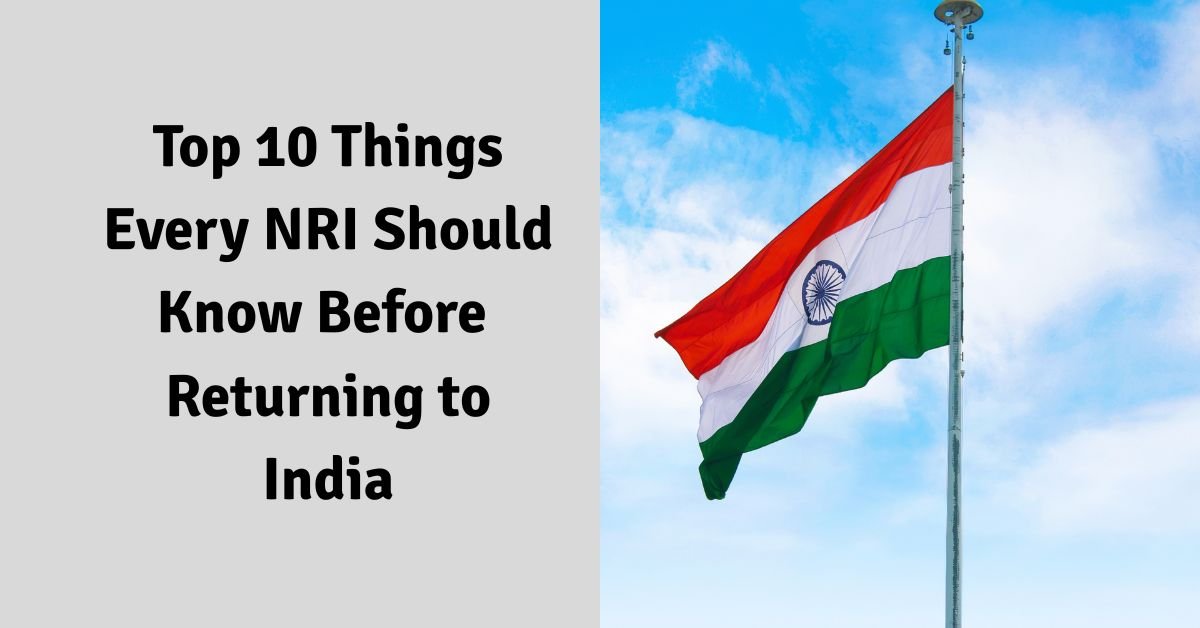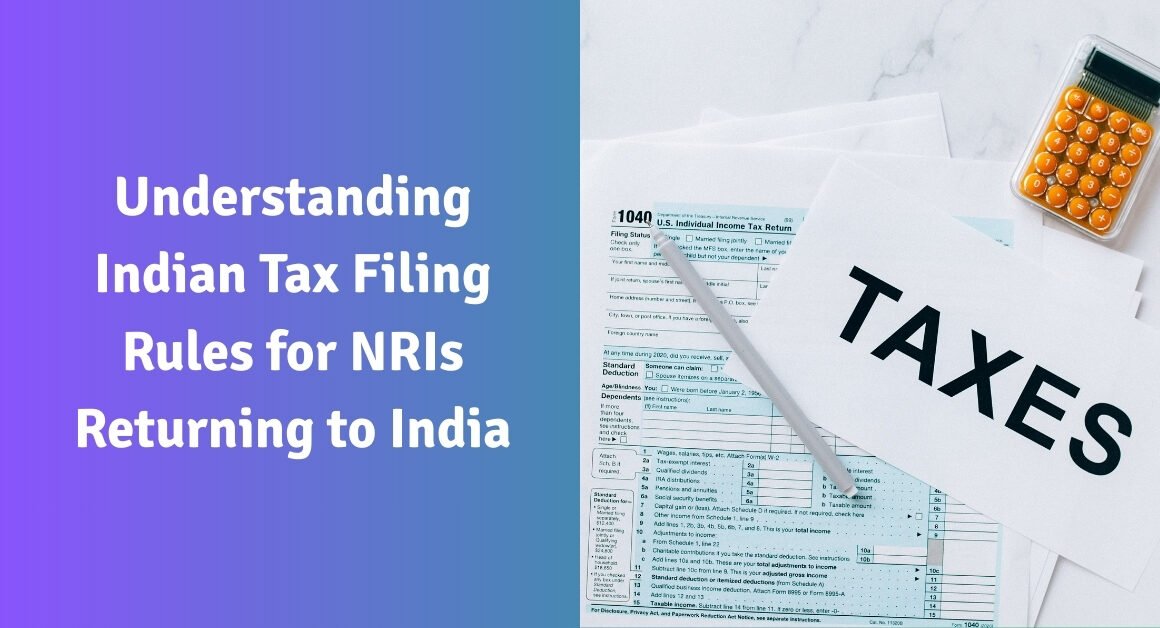Planning to return to your roots? While returning to India can be as thrilling as it gets, it entails some fiscal and bureaucratic implications that need careful planning. With the economy of India developing at a dazzling rate and prospects broadening across industries, many NRIs are setting out on the return journey. Based on recent estimates by economic analysts and global institutions such as the World Bank, India remains among the world’s fastest-growing major economies. Here are things you should know to ensure a seamless transition and one that is financially healthy.
1. Plan Your Tax Residency Status
Your tax position in India varies based on whether you are considered a Resident or not. You will be considered a Resident if you remain in India for 182 days or more during a financial year. Otherwise, you may be eligible as a Resident but Not Ordinarily Resident (RNOR) for the transition period, which provides specific tax benefits for foreign income. It is important to understand this difference because it will affect how your international income is taxed in India. Strategize your return date to optimize tax benefits during the transition phase.
2. Convert Your Bank Accounts
NRE (Non-Resident External) and NRO (Non-Resident Ordinary) accounts will need to be shifted to resident accounts when you are back. Do consider opening a Resident Foreign Currency (RFC) account to retain your foreign earnings in the currency of origin, which can come in handy in case you’re expecting future spending overseas. Cool fact: RFC accounts enable you to keep funds in any one of the global major currencies and serve as an insurance against fluctuations in currency!
3. Update Your KYC and Investment Information
Have all your investments in financial instruments, such as mutual funds, shares, and insurance policies, updated to your new residential status. Your KYC documents must be updated with your new Indian address and phone numbers. This is not an optional step – old KYC information can cause transaction holds and regulatory problems with financial institutions.
4. Resolve Property and Real Estate Issues
If you have property in India that you acquired as an NRI, inform the authorities regarding your status change. Certain properties may have certain special conditions regarding NRI ownership that must be dealt with. Property owned in India could also impact your wealth tax calculation, so discuss this with a property tax specialist to know the consequences of your return.
5. Check Your Insurance Coverage
International health insurance policies usually do not offer full coverage in India. Check and renew your health, life, and property insurance to provide sufficient cover for your new situation. Indian insurance markets provide a number of specialized returning NRI packages that fill the gap between international and local coverage during your transition.
6. Prepare for Cost of Living Adjustments
Once you’ve been abroad, you may get reverse culture shock when it comes to the cost of living. Some things might be cheaper, but others such as quality health care, education, and a place to stay in prime locations can be exorbitant. Make a clear budget that accurately reflects the Indian economic reality at the time and not based on outmoded impressions or recollections prior to your departure.
7. Reestablish Your Social Security
If you made contributions to foreign social security systems, check if there are totalization agreements between your host country and India. These agreements will help avoid double taxation and ensure you get benefits owed to you. As a planning step for retirement, transfer your foreign pension to Indian schemes where favorable and allowed.
8. Master Currency Exchange Strategies
Make arrangements for transferring your funds to India carefully to avoid foreign exchange losses. Make staggered transfers instead of transferring all the money at one go, particularly if the currency market is volatile. Most banks have specialized NRI repatriation facilities on preferential exchange rates – shop around before undertaking big transfers.
9. Understand Employment Market Realities
The Indian job market has evolved significantly in recent years. Research current salary benchmarks, industry trends, and skill demands before your return. Your international experience is valuable, but may need to be contextualized for Indian employers. Network with professionals in your field who have made similar transitions.
10. Create a Comprehensive Financial Plan
Integrate all aspects of your financial life – from investments and taxation to insurance and estate planning – into a cohesive strategy that reflects your new status as a returning Indian resident. Working with a financial advisor who specializes in NRI returns can provide valuable insights and help avoid common pitfalls during this transition.
Conclusion
Coming back to India presents the opportunity to reconnect to your heritage but utilizing your world exposure. It can be emotionally enriching as well as fiscally sound, provided appropriate planning is undertaken for your residential status, bank facilities, investment, and financial considerations. A very important part is to commence preparation well before and take help of professionals at relevant places.
FAQs
1. When should I start planning my return to India?
Ans – Ideally, begin preparations at least 6-12 months before your planned return date.
2. Do I need to close all my foreign bank accounts?
Ans – No, but you must declare them in your Indian tax returns once you become a resident.
3. Can I continue contributing to my foreign retirement accounts after returning?
Ans – Yes, but the tax treatment will depend on your residency status and applicable tax treaties.
4. What happens to my foreign investments after I return?
Ans – You can maintain them, but must declare them and may face different tax implications as a resident.
5. Is there a tax-efficient time of the year to return to India?
Ans – Returning early in the Indian financial year (April-May) can often optimize your tax position.
6. Can I bring my household goods duty-free when returning?
Ans – Yes, subject to conditions including a minimum stay period abroad and usage requirements.
7. What should I do about my foreign driving license?
Ans – Apply for conversion to an Indian license within one year of your return.
8. Are there special school admission quotas for children of returning NRIs?
Ans – Some schools offer NRI quotas, but policies vary widely and often require advance applications.
9. How do I transfer my credit history from abroad to India?
Ans – Unfortunately, credit histories don’t transfer directly; you’ll need to rebuild credit in India.
10. Should I maintain my foreign citizenship/permanent residency status?
Ans – This depends on your long-term plans; many returning NRIs maintain their foreign status as a safety net.
Disclaimer: The information provided here is for educational and informational purposes only and should not be construed as financial, legal, or tax advice. Consult with a qualified professional before making any investment decisions. We do not accept any liability for errors or omissions in this information nor any direct, indirect, or consequential losses arising from its use.





